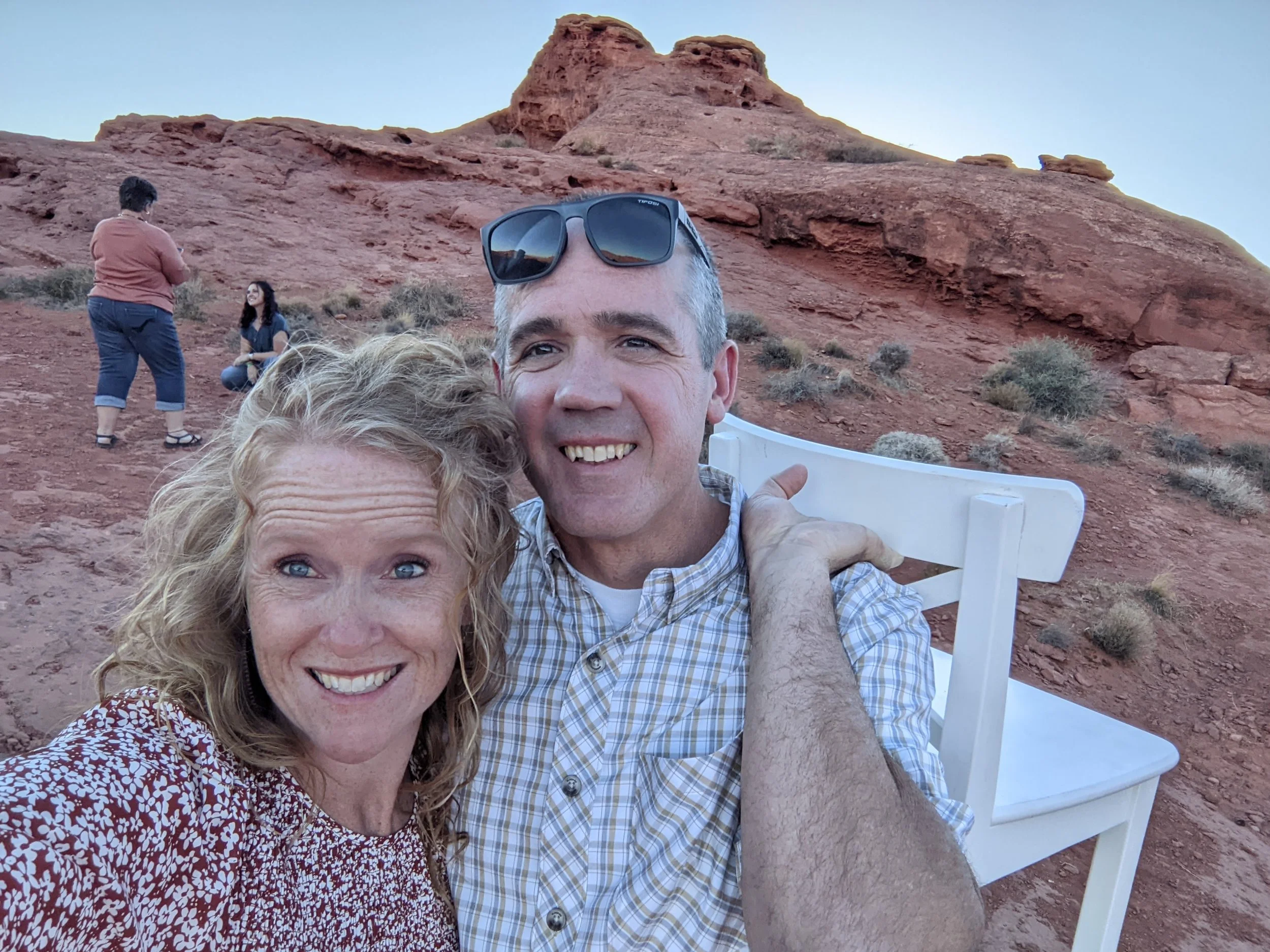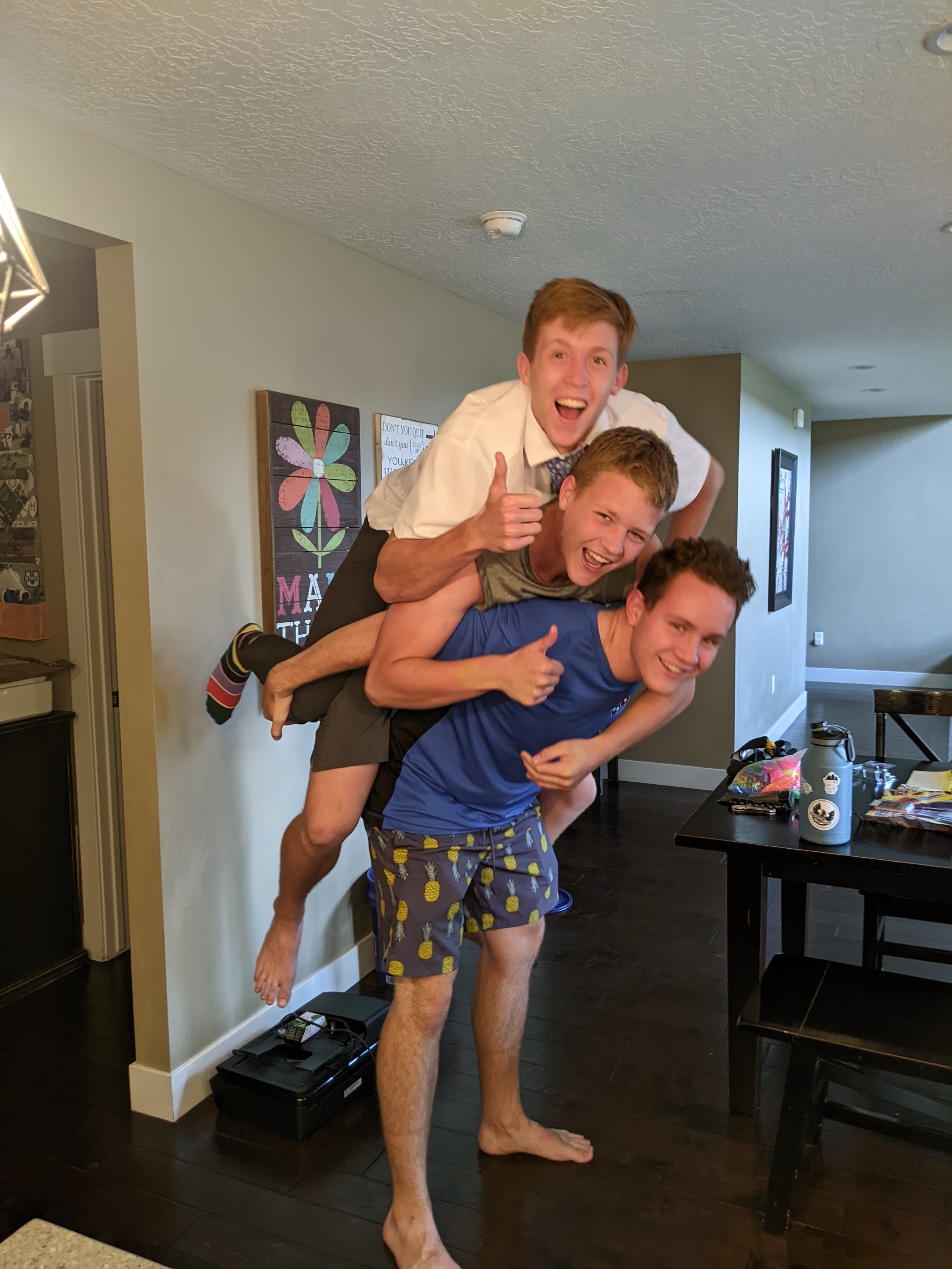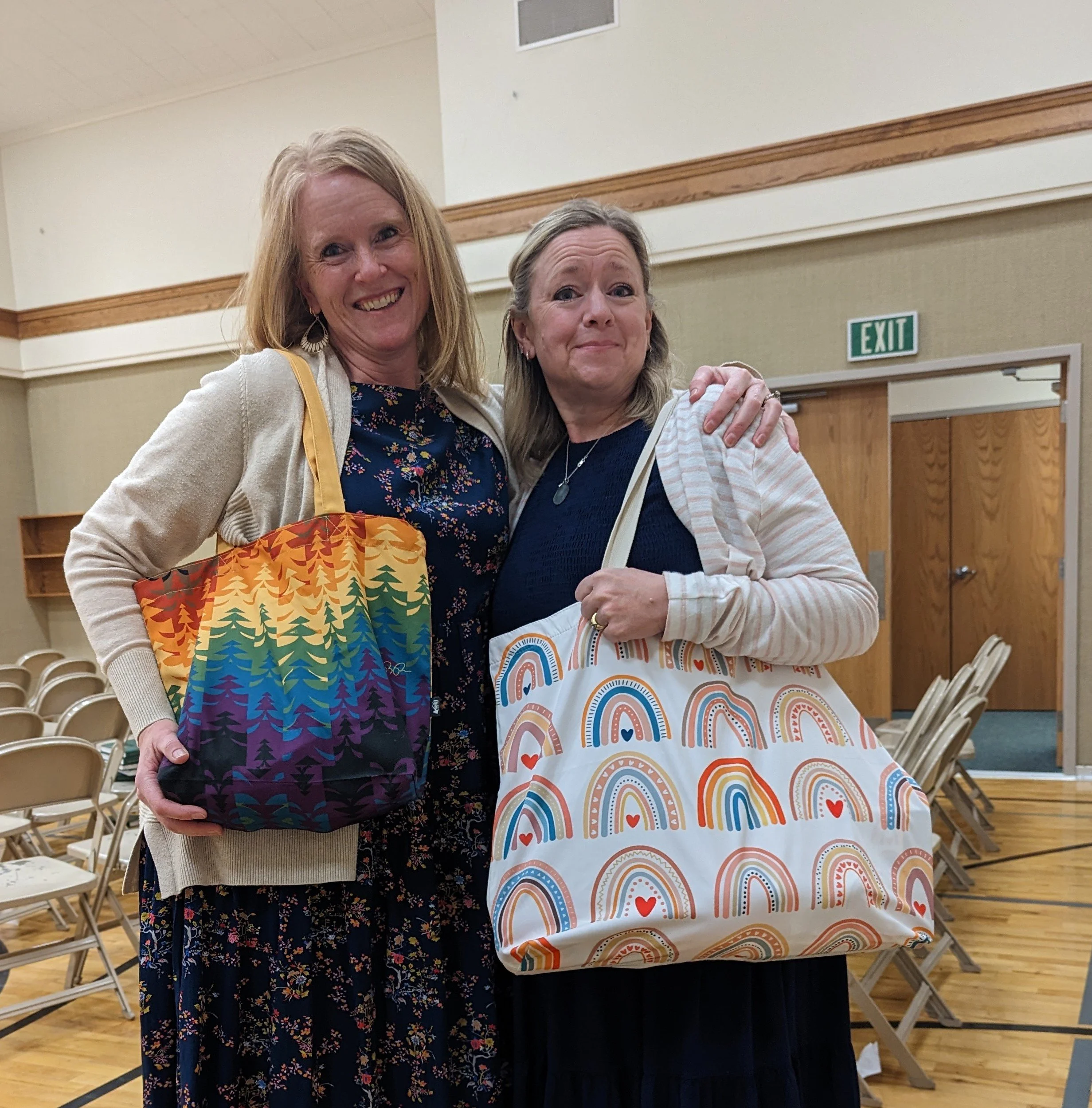“Did you know?” It’s a question so many parents of LGBTQ kids field, and Maranda Thompson of Kaysville, UT is no exception. She and her husband Jacob didn’t fully know their son Riley, 22, was gay until just last year. But Maranda says they have always known Riley was “highly intelligent and super anxious. He was always very obedient, great in school, a rule follower and so easy to parent. Riley was always a happy, good kid.” Their first inkling about his sexuality occurred when Riley was 14 and admitted to viewing gay pornography. Maranda says, “Looking back, how dumb were we?” Riley began therapy for his anxiety around that time, and Maranda pulled the therapist aside and asked if he thought Riley was gay, wondering “what are we dealing with?” Maranda says, “I love how the therapist didn’t lock him in a box with gender and sexuality at that age but said he might be fluid. And just to wait and see. Looking back, I’m grateful for that.”
In high school, Riley enjoyed choir, swim team, and he seemed to like dating girls. But right before he went on a mission, Riley told his mom he might be bisexual. Maranda replied, “When you decide to get married, if you marry a girl, just make sure you’re 1000% in.” Riley replied, “Of course,” and they didn’t speak of it again for the next two years while Riley served his mission in Roseville, CA. A lover of languages and linguistics, Maranda says Riley spoke Spanish “like a boss. He seemed to thrive on his mission – he’d always been the kid in high school who showed up to every youth activity, was 1st assistant in his priest quorum, was super righteous and churchy.”
After Riley came home, he began his schooling in St. George where he studied computer science. After hanging out with his roommates and dating girls for about six months, his anxiety spiked again, which his parents attributed to school, but always wondered… what if? One night, Riley called and again said, “Mom, I think I’m bisexual.” Maranda asked, “Riley, who are you attracted to?” He replied, “Men.” She said, “I’ve been waiting for you to tell me. Riley, I do not support celibacy and loneliness, and I expect an amazing son-in-law. Your dad is waiting for you to tell him, too.” Maranda says, “Of all my parenting moments, that was a good one. But it was the first time in my life that something came out of my mouth that 1000% went against church teachings. But I felt very inspired that’s what he needed, and in that moment, I chose my son over anything else. Our path forward since has been that we choose him; nothing gets in the way of that.”
About a month before Riley came out, Maranda’s close friend introduced her to the Questions from the Closet podcast, but Maranda waited to dive in until her son had come out. “That first podcast, everything in me opened up; it was an insane blessing. The work Ben and Charlie are doing is straight from God.” She was excited to share it with Riley and when he listened to it he found validation, love and a path forward. Then, Maranda found the podcast At Last She Said It. “I loved it. It helped me understand and gave me vocabulary for so many things I was feeling as I entered a complete faith crisis. I told my husband, ‘These ladies are keeping me in the church’.” Maranda also found her way to Lift and Love, where she says the early podcasts made her feel “so seen and heard and ok.” The year Riley came out, Maranda logged 22,000 minutes on Spotify, thanks to her podcast grad school education.
Of this time, Maranda says, “This was the most painful, heart-opening experience of my life. I immediately started questioning church. I picked my kid, and thought, ‘What the hell is wrong with the church?’ I went through a grieving process, always wondering am I going to stay? Early on, in my soul, I felt that not everyone can stay, but if everyone leaves, it won’t get better. I felt I could be one of those people who could stay. I’m not sure how, but I think I can, and I’ve tried to hold on to that.” Maranda feels her own faith crisis has contributed to her ability to bond with Riley, who has been very open with his parents. “As he shares his feelings going through this, I’m able to understand what he needs and where he stands spiritually.”
Maranda says if their kids want emotional support and comfort, they come to her. But if they want logic, reason and great solutions, they go to their dad. “I tell Jacob he’s the best gay dad ever to which he replies, ‘Stop calling me gay dad.’ But Jacob’s my hero. He’s kind, stalwart and straight forward. A few weeks after Riley came out, he called us panicked and said, ‘I don’t know what to do next.’ Jacob said, ‘Well, go on a date.’ and followed up with practical and loving advice. After we hung up, I said ‘How’d you know what to say?’ And he said, ‘I just told him what I’d say if he was dating girls!’ I was like, ‘Oh, ok, that makes so much sense’!”
Maranda had moments where she was scared how people might treat Riley, that the world might be unkind. When he decided to room with a bunch of fellow returned missionaries at Utah Tech, she wondered if he needed his own room. But she laughs that he replied, “Mom you are so old.” She’s relieved that his generation is “so accepting, they’re cool with it…” Maranda says people her age have also been wonderful. They seem to be committed to saying, ‘Ok, we’re going to do this better than our parents did’.” Maranda says, “My faith in humanity has gone through the roof.”
Under her own roof, came the moment in which each of Riley’s three younger brothers would find out he was gay. Tyler—18, was a senior at the time Riley told him and he seemed surprised at first. Maranda said, “Think about him in high school.” And Tyler (the ”cool, ASB kid”) laughed, “Yeah! He was the token gay kid, with all those girlfriends. And he made cakes. Mom, do you know how much street cred I’ll get for having a gay brother?” Slightly younger and more aloof, Noah—16, was “a bit clueless even though we’d been talking about it around the house for months. One night I said, ‘Noah, you know Riley’s gay, right?’ to which he replied, ‘What? Mom, you have to tell me things. Wait… does this mean Riley has to leave the church’?”
Maranda says, “That’s so sad that that’s the message we’re sending. I told Noah that whatever path Riley took, we’d support and continue to honor his personal revelation.” The Thompsons youngest, Dallin—10, who can be “mouthy, funny” has taken to gleefully weaponizing the word homophobic in a humorous way around the house. All the Thompson brothers love and support Riley, and while Tyler now gets a little flack on his mission (in the Dominican Republic) for having a gay brother, “he can handle it.”
One of the most dissonant moments of Maranda’s life were the months between Riley coming out in February of 2022 and Tyler getting his mission call in April. “I spent those months in faith crisis, supporting one gay son and mission prepping another. On Riley’s mission, I’d written him letters full of quotes by prophets—I was so adorable. When I write to Tyler, I focus on loving those he serves and building a personal relationship with Christ—I just can’t with prophet quotes right now.” She says reading Brian McLaren’s book, Faith After Doubt, calmed her soul. Maranda says she was “brutally honest” in her recent temple recommend interview. When she talked to Riley about it, he said, “Mom, I can’t say those things in an interview.” Maranda replied, “But your mom can!” Tyler jokes that Maranda had better hang on to her recommend in case she needs it when he gets home. Jacob has never entertained the idea of leaving the church and is also fully supportive of Riley and what he needs to thrive and be happy. Maranda feels kids need more black & white thinking when they’re little, but “they get a free ticket into nuance when they are ready if their parents are nuanced.”
Riley says he doesn’t regret a single thing about his mission and still goes to church, although it has become very difficult (“He’s always loved God so much”). He did ask to meet with a therapist this summer to process religious trauma. Maranda says Riley attends Encircle and has found that the general consensus among his peers there is that those who are openly queer do not last in the LDS church. Riley’s been dating and still feels comfortable going to the temple. Maranda says, “He calls himself the most emotionally well-adjusted gay man he’s ever met.” After he returns from a date, he’ll joke with his mom about the “trauma bond” he and his fellow gay male date shared, and she’ll ask, “What was his trauma level?”
“Every time we talk about his dating, Riley thanks me. He is often astounded by the way other parents have responded to their LGBTQ children. He says, ‘You and dad being the way you are has made it so much better. All my queer friends want to meet you and hug you.’ I reply, ‘All we said was find a good husband. He knows we’ve got him, church or not. Whatever he needs. He’s such a great human.”
Maranda believes representation matters. As a junior high math teacher, she loves when her students recognize her low-key rainbow jewelry, especially when they complement it in a way in which she knows it also means something to them. Last June was her first Pride month knowing she had a gay son, and Maranda noticed how much it meant to her to see rainbows everywhere. “I realized, that was one more place that is safe for my son. That home, that business, that family is safe, they get it.” Every week, she shows up at church with her rainbow bag from the REI outdoor Pride line, and recently, a friend stood up from across the chapel to show Maranda a large rainbow bag of her own. “It meant so much. She doesn’t even have a dog in the fight; she’s just all about love.” After Maranda mentioned her feelings about seeing rainbows to her therapist, the next time she showed up for a session, she was touched to see a framed rainbow art piece hanging on the wall.
Maranda calls her town a bit of a Mayberry and says people do try really, really hard to be nice—including the “good, kind, loving” people of her ward who she says all love Riley. They have sat through a few uncomfortable lessons at church, one in which someone said you can’t fly a Pride flag or pay for a gay wedding. Afterwards, Maranda met with the bishop (who she calls the kindest person on the planet) and told him they could do better. He then prepared a talk and sent it to her to prescreen, in which he outlined all the good, supportive things church leaders have said about being kind and loving toward LGBTQ people.
Of her journey, Maranda says, “I thought I was a loving person, but had no idea how much more I could love. It’s been a wild ride… I took this year to learn and calm down-- just get to a place where I could start listening and teaching with patience. Recently, I had a conversation with an older man in my neighborhood in which he expressed some hurtful views about LGBTQ and I put my hand on his arm and gently said, ‘You know my son’s gay? The way you’re saying things is so hurtful.’ This transitioned into a 20-minute loving conversation led with courage and love and understanding, where six months ago, I was so fearful and hurt. I’m getting there – getting to a place where I can be an ally and be useful in this space. I’m ready.”






















